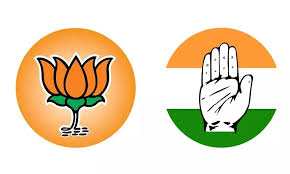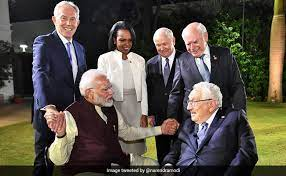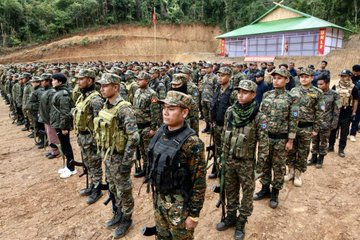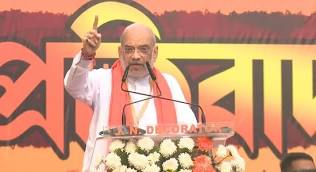“Taking gifts, accepting presents, the MP that asks questions and that party… could they ever do any good for Bengal or Bharat?....Say it out aloud, is it possible for them?” Amit Shah in his Esplanade/Dharmatala rally in Kolkata.
(This is the first time someone from the BJP's top two — Prime Minister Narendra Modi and Amit Shah — had referred to in public the allegations levelled against Mahua Moitra. The Ethics Committee of Lok Sabha has recommended expulsion of the lawmaker representing Krishnanagar parliamentary segment.)
"The Left Front and Trinamool Congress destroyed Bengal over the years. Mamata Banerjee came to power by bringing a parivartan (change). But has corruption stopped in Bengal? Has infiltration stopped? Has political violence stopped? Has appeasement stopped? Did real parivartan come?," Amit Shah said in a party rally in Kolkata on Nov 29, 2023
Shah also alleged that the Mamata Banerjee government is facilitating infiltrators with voter IDs and Aadhaar cards. “In the entire country, most of the political violence takes place in Bengal. The Mamata Banerjee government could not stop infiltration in Bengal. It is the same Mamata Banerjee who used to protest against infiltration in Parliament who is now facilitating infiltrators with voter ids and Aadhaar cards. The people of Bengal are fed up with infiltration and syndicate raj in the state,” he said.
“Today I dare Mamata Banerjee to suspend these leaders from her party. But she cannot do it as she is chanting Durga’s name every day to pray that her nephew’s name does not come up. Those who indulge in corruption cannot make Bengal corruption-free,” said Shah.
“I come from Gujarat and I have never seen in my entire life that bundles of cash are being recovered from the house of a leader. The TMC has damaged the reputation of Bengal in the entire country because of its corruption. Jyotipriya Mallick, Anubrata Mondal and Partha Chatterjee…. from cattle smuggling, coal smuggling cases to requirement scam…. they have looted crores of rupees meant for the people of Bengal,” Shah said.
In 2019, fiercely contested Lok Sabha polls, the BJP had won as many as 18 seats. In 2021 assembly polls, the saffron party emerged as a key challenger. While the communists and Congress scored zero, the Lotus party had arrived and even Mamata Banerjee had lost to BJP nominee Suvendu Adhikari in Nandigram.
In the 2021 battle of Bengal, the Lotus party could rope in support of backward castes - Rajbongshis and Namasudras - despite the Hindutva politics. A political philosophy – ‘Hindu-Hindi-Hindustan’ was made 'acceptable' for the people and thus ‘Jai Shri Ram’ could not be dismissed as a mere slogan of north India and Gujarat.
The BJP also succeeded to make Pishi-Bhaipo (Mamata-Abhishek Banerjee) duo a symbol of corrupt, tyranny and worse dynastic succession, many said during the polls. The saffron outfit's electoral success in West Bengal ought to be seen as a great impact brought in the Bengal socio-political realm by the trio Modi-Amit Shah-Nadda.
Not long ago, Mamata Banerjee had screamed, "Who is Amit Shah?".
The Home Minister also made it clear that corruption will be chief electoral tool of the BJP to take on Mamata.
The Enforcement Directorate has arrested minister former minister Mallick in connection with alleged irregularities in ration distribution in the state in October.
Last year, central agencies had arrested minister Partha Chatterjee and TMC MLAs Manik Bhattacharya and Jiban Krishna Saha in connection with the teachers' recruitment scam. Another heavyweight TMC leader Anubrata Mondal is currently in Tihar jail for his alleged involvement in the cattle smuggling case.

Notably for Bengal politics and so-called mass-based leader Mamata Banerjee; in the poll season of circa 2021, she had developed nervousness, claimed leg-fracture and was compelled to vaunt her ‘Shandilya gotra’ indicating her lineage to the 'highest clan' among the Brahmins.
The 'Bhadralok' are mainly concentrated in and around Kolkata and in southern parts of urban hubs. Subalterns are prominently represented by Scheduled Castes, Scheduled Tribes and Other Backward Classes and they stuck to BJP since 2018 Lok Sabha polls.
Mamata knew her Muslim-appeasing 'sister' image was not enough. She also had to play out other games - the local versus outsiders card urging the voters to not allow leaders from Gujarat dictate political terms in the state.
It's altogether a different chapter that today, she is busy or gives an impression of her busy engagement in a state like Goa.
The impact, however, came in the form of a rebuke from her one-time admirer Arvind Kejriwal when the AAP leader taunted, 'aise nahi chalti democracy'.
The BJP trio's biggest achievement was not the number of seats. But rather they achieved ‘something’ which was not possible in Bengal without ‘Bhadralok intelligentsia’.
Never in state’s history, were the upper castes and Kolkata-based intellectuals and their Left-liberalism -- more often anti-Hindu - got so much marginalised.
Frustration still speaks. The Bengal media simply ignored the gruesome post-violence in 2021 meted out to poor people.
Mamata's and earlier the Leftists' appeasement made Muslims aggressive and the brunt of that was faced by rural Bengal Hindus - SCs, STs and OBCs.
"In Bengal, the upper caste trio belonging to Brahmin,Kayastha and Baidya who together constitute less than a fifth of the population in the state, yet, they have been dominating in every walk of life," says the prestigious news magazine
'Mainstream' once edited by illustrious Nikhil Chalravarty.
Thus, the Matuas, Koch-Rabongshis, smaller Adivasi groups even Christians, Gorkhas in hills and rural poor in Bankura, Purilia, Birbhum and Jhargram became strong BJP supporters.
There was another reason. Muslims in rural Bengal also walked away with all OBC quota benefits. It is also true that the ‘Partition’ created on communal lines had resulted in an "unprecedented suffering for the less privileged section of people".
On slamming leaders from Gujarat, 'Mainstream' said acidly - "Nevertheless, by toeing such a narrow regional line, no leader can build a Pan-India image. The TMC leaders must have realised that...".
Another take away from Bengal politics has been the exposure of sheer shambles in Bengal's administration and the running of its highly politically opportunists Babudom.
Even the word 'babudom' making it akin to bureaucracy in India is also a gift from the state only as hundreds of 'Bengali clerks' working under British colonial masters posed themselves as doing something extra ordinary preferred to be addressed as 'Babus' and some as 'bara Babus'.
Alapan Bandyopadhyay, West Bengal chief secretary, making news rather for wrong reasons and 'avoiding' a meeting even with Prime Minister of India on cyclone just to please his political boss in Kolkata's power centre shows
things are rotten at the roots.
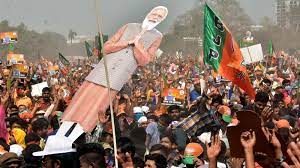
The 'Mahua Moitra episode' is a major issue played up by the BJP leaders in West Bengal as well.
No less than Leader of the Opposition, Suvendu Adhikari, leads the charge and also asserting that it should also be ensured that Moitra is unable to contest any election for at least five years.
BJP MP Nishikant Dubey had in October submitted a complaint to the Lok Sabha Speaker Om Birla against Moitra, accusing her of having accepted expensive gifts for posing questions in the House for industrialist Darshan Hiranandani to target the Adani group and Prime Minister Modi.
The complaint was based on allegations levelled by Moitra’s former partner, Supreme Court advocate Jai Anant Dehadrai. The Lok Sabha’s Ethics Committee, which looked into the allegations, recommended Moitra’s expulsion from the House and an investigation against her.
Trinamul’s top leadership — Mamata and Abhishek Banerjee — had remained silent for weeks in the initial stages of the controversy, with party spokespersons saying it was up to the MP herself to contest the charges.
This had triggered speculation whether Moitra enjoyed the backing of the party brass and prompted CPI-M and Congress leaders to ask tauntingly whether Trinamul planned to sacrifice the MP as part of a deal with Modi and Adani.
However, on November 10 when Abhishek questioned the ethics panel’s rationale in recommending Moitra’s expulsion. Within four days, Moitra received a further shot in the arm when she was appointed Trinamul district president for Krishnagar as part of an organisational reshuffle.
Now lately, even Mamata Banerjee seemed backing her MP and broke silence on the controversy with a statement.
At a party meeting, the chief minister said: “Their plan now is to also throw Mahua out. That will make her more popular….”
“What she used to say inside, she will say outside. She will hold media conferences daily and say the same things outside Parliament. Done. How does it matter?”
ends








